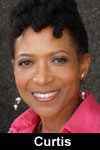Mary C. Curtis: Remembering a Different Martin Luther King
Posted at 11:20 am, April 4th, 2008
Today is the 40th anniversary of the murder of Dr. Martin Luther King Jr.
In January, to mark his birthday, this country celebrates a day off and snippets of racial reconciliation in “I Have a Dream.”
It would be fitting that on the day of his violent death, the country look to the pain in his message, the occasional despair, the mood that defined April 4, 1968.
The man who had a dream said in that same speech: “America has given the Negro people a bad check, a check which has come back marked ‘insufficient funds.’”
At a time when King is the “good” Reverend, the anti-Jeremiah Wright, remember King’s letter from a Birmingham jail.
King chided his fellow clergy’s support of the status quo in the civil rights struggle when he wrote: “I have almost reached the regrettable conclusion that the Negro’s great stumbling block in the stride toward freedom is not the White Citizen’s Counciler or the Ku Klux Klanner, but the white moderate who is more devoted to ‘order’ than to justice.”
When he joined with striking sanitation workers in Memphis, King was fighting for the forgotten in an America where many were questioning his opposition to the Vietnam war.
Sometimes, he even doubted himself.
This is not the plaster saint of January. This King had strong emotions and self-doubt.
But he didn’t let any of it defeat him, not the conditions he fought or the resistance he met from all sides. “Let us not wallow in the valley of despair,” King said.
“We refuse to believe that the bank of justice is bankrupt.”
In that 1963 letter from the jail, he also wrote: “Even if the church does not come to the aid of justice, I have no despair about the future.”
“We will reach the goal of freedom in Birmingham and all over the nation, because the goal of America is freedom.”
The Rev. Martin Luther King honored in January is larger-than-life, with a message stripped of the urgency he preached. It’s a message designed to give comfort. And it’s not who King was.
On April 4, as we remember his end on a motel balcony, it’s a reminder that he was flesh and blood – a man.
But a man who accomplished so much, who got angry and frustrated and kept fighting, who made others angry with a relentless focus on injustice that could not be tamed.
To see Martin Luther King, 40 years after his death – not as an icon, but as a truly human being is to realize his greatness and miss him even more.





April 5th, 2008 at 6:33 am |
Mary, I take issue with you labeling Dr. King, “the anti-Jeremiah Wright. The vast majority of white “journalists/pundits/columnists” with the major newspapers and on networks and the garbage-laiden cable “news” cheaply and ignorantly continue with their front-page, wide-screen, hi-def lynching of Rev. Jeremiah Wright? Very simple: a “good story” to some is always worth far more than the truth!
Several weeks ago, ABC’s Good Morning America (variety show) ripped from several of Dr. Wright’s sermons “inflammatory and anti-American” sound bites, Virtually everyone else in the “business” immediately grabbed them up for flashy display and reason to condemn Dr. Wright for being “anti-American” and, yes, even “racist.” And then, of course, they all were quick to condemn Barack Obama for having sat through all these “anti-American, racist” sermons in Dr. Wright’s church–for twenty years.
It was not until I was able to view the whole of Dr. Wright’s sermons about a week ago, on http://www.truthdig.com, that I realized just how bad a “lynching” it really is–and it continues. I would wager that many, if not most, of these “journalists and pundits” have yet to view these sermons in their entirety. Why? Because they just don’t want to face the fact that they have assassinated the character of Dr. Wright in their “good stories,” while at the same time tarring Barack Obama with these totally out-of-context quotes. Have you viewed the sermons in their entirety? And, if so, I’d be most interested in your reaction.
By the way, I am a 71-year-old male who happens to be white; was born and grew up in racist South Louisiana back in the 40s and 50s; and, as an affiliate correspondent for NBC News, covered the Civil Rights Movement in the 1960s.
As I am sure you know, Mary, these same shabby journalists/pundits/columnists could easily find similar so-called “inflammatory, anti-American sound-bites in the sermons and speeches of Dr. Martin Luther King, Jr.
Jim Michie
October 11th, 2010 at 11:46 am |
Thanks so much, Thomas. Please follow my writing for other sites, including PoliticsDaily.com and TheRoot.com.